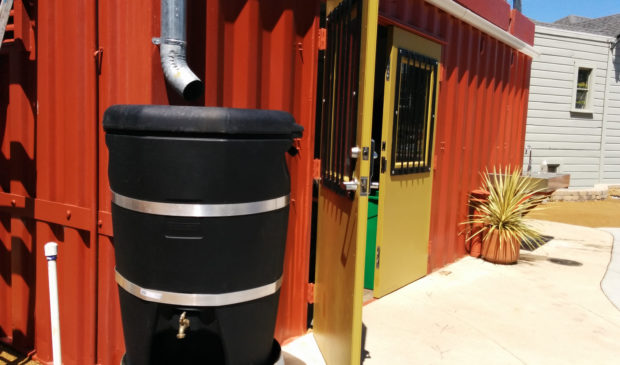Austinites to receive incentive for storing rainwater
Tuesday, August 9, 2016 by
Cate Malek Property owners who have gone above and beyond in their efforts to store rainwater will start to receive a discount on their drainage fees next year.
The Watershed Protection Department has proposed the change in an attempt to create an equitable system for assessing the monthly drainage fees paid by property owners. The new system, which will be based on the amount of water stored on a property, could reduce the drainage fee on that property by more than half. Council voted unanimously to adopt the changes at its meeting on Aug. 4.
“I don’t think that there will be thousands of folks doing this right away,” Saul Nuccitelli, an engineer for Watershed Protection, told the Austin Monitor. “But there are some good folks who are doing stuff now who deserve some sort of discount.”
The discount would be applied to all properties in the city of Austin, whether they’re residential or commercial. And property owners can use a wide variety of methods to capture rainwater, from barrels to cisterns to a depression in the ground.
The exact amount of the discount will be determined in the coming months as the program is developed, but the city has estimated ballpark figures. A household of median size in Austin pays about $11.80 per month in drainage fees. That fee would be reduced by about 22 cents per month for an average 55-gallon rain barrel on the property.
The biggest discount a property owner can receive is around $8.10 per month for a 3,000-gallon cistern. After that, the discount would be capped at just over 69 percent of the fee charged to the property. The reason for the cap is that the city still needs to tax property owners to maintain its drainage system.
In the past, commercial properties received a flat 20 percent discount for having a detention pond. The new discount is meant to give all property owners – both commercial and residential – a reward if they “voluntarily store more water than what they are obligated to do,” Nuccitelli said.
Rainwater storage has a number of environmental benefits. It helps prevent extreme flooding and erosion, and it improves water quality. It also helps soil stay cooler and prevents it from drying out, which in turn supports vegetation.
Nuccitelli said he doubts the discount will have significant environmental effects right away but that the impact of the change would increase over time.
“We’re making sure that there’s equity in how we’re distributing the charge first and foremost,” he said. “Then if there’s a benefit to the drainage system as a result, great.”
Photo by Liz Henry made available through a Creative Commons license.
The Austin Monitor’s work is made possible by donations from the community. Though our reporting covers donors from time to time, we are careful to keep business and editorial efforts separate while maintaining transparency. A complete list of donors is available here, and our code of ethics is explained here.
You're a community leader
And we’re honored you look to us for serious, in-depth news. You know a strong community needs local and dedicated watchdog reporting. We’re here for you and that won’t change. Now will you take the powerful next step and support our nonprofit news organization?











